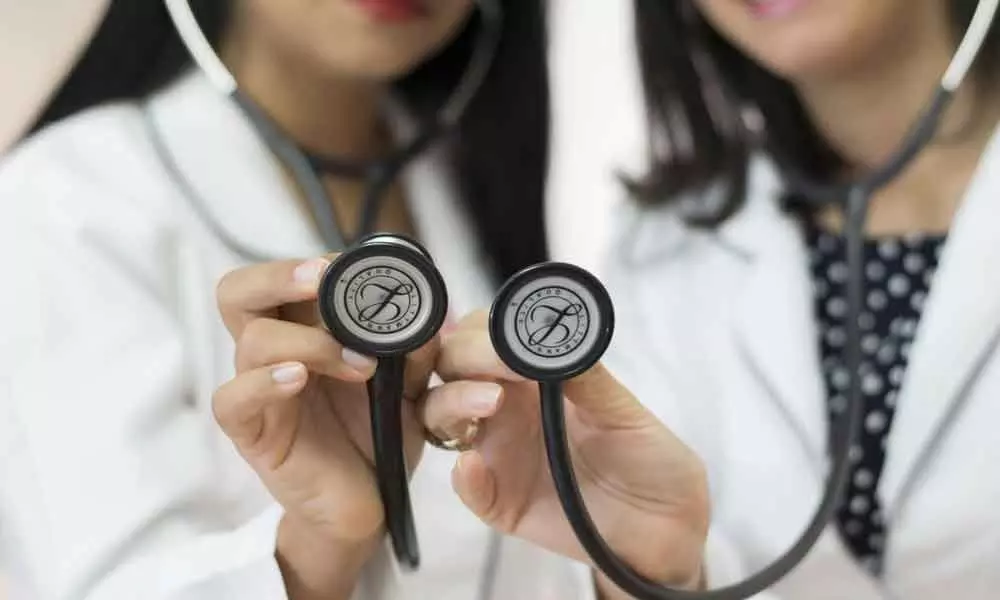Live
- WPL 2025: Matthews, Sciver-Brunt and Harmanpreet carry MI to massive 213/4
- MLA Anirudh Reddy Accuses KTR of Involvement in Manhattan Project Scam
- TGPSC Clarifies on False Propaganda Regarding Group-1 Recruitment
- Hyderabad Police Ensures Security as Holi and Ramadan's Second Friday Coincide
- Five MLCs Elected Unopposed in Telangana Under MLA Quota
- Sambhal prepares for a peaceful Holi with tightened security and special patrols
- CNG, PNG prices to become cheaper in Rajasthan from March 14
- Anti-Rape ad to screen in theaters before movies, like health advisories
- Prodigy Finance Offers Three Scholarship Awards totalling an amount of $19,000 for Global Students Starting Fall 2025
- Champions League drama likely to affect La Liga with big games this weekend
New York: 80% of medical students feel a low sense of personal achievement


Despite the prestige of becoming a physician, 80 per cent of medical students report a low sense of personal achievement, a new study shows.
New York (IANS) Despite the prestige of becoming a physician, 80 per cent of medical students report a low sense of personal achievement, a new study shows.
The researchers are concerned about the role of smartphone addiction in medical students as 22 per cent of participants met the basic score qualifying for smartphone addiction.
For the findings, published in The Journal of the American Osteopathic Association, researchers surveyed 385 first to fourth-year medical students to assess their levels of burnout, a psychological syndrome resulting from prolonged exposure to stressful work.
According to the researchers, burnout has three dimensions: emotional exhaustion, depersonalisation, and low sense of personal achievement.
"That 80 per cent feel a low sense of achievement is a bit ironic, considering that these are all high-performing individuals," said study lead author Elizabeth Beverly, Associate Professor at Ohio University in the US.
"However, it also makes sense in that they have gone from an environment where they were standouts to one where they are now on an equal academic playing field," Beverly said.
The researcher added that each year of medical school has its own unique and significant stresses that prevent students from ever fully acclimating to the challenge.
In year one, students are overwhelmed by the vast amount of knowledge they have to learn. In year two, they begin studying for board examinations.
Year three sends students on clinical rotations to begin real world application of their knowledge. Year four is focused on graduation and matching into a residency programme.
According to the study, only 2.3 per cent of participants reported high levels of emotional exhaustion, while 17 per cent reported high levels of depersonalisation, a form of clinical detachment.
Both of those dimensions of burnout are associated with higher perceived stress, poorer sleep quality and higher smartphone addiction scores.
Conversely, only higher perceived stress is associated with feeling a low sense of personal achievement, the study said.Despite the prestige of becoming a physician, 80 per cent of medical students report a low sense of personal achievement, a new study shows.
The researchers are concerned about the role of smartphone addiction in medical students as 22 per cent of participants met the basic score qualifying for smartphone addiction.
For the findings, published in The Journal of the American Osteopathic Association, researchers surveyed 385 first to fourth-year medical students to assess their levels of burnout, a psychological syndrome resulting from prolonged exposure to stressful work.
According to the researchers, burnout has three dimensions: emotional exhaustion, depersonalisation, and low sense of personal achievement.
"That 80 per cent feel a low sense of achievement is a bit ironic, considering that these are all high-performing individuals," said study lead author Elizabeth Beverly, Associate Professor at Ohio University in the US.
"However, it also makes sense in that they have gone from an environment where they were standouts to one where they are now on an equal academic playing field," Beverly said.
The researcher added that each year of medical school has its own unique and significant stresses that prevent students from ever fully acclimating to the challenge.
In year one, students are overwhelmed by the vast amount of knowledge they have to learn. In year two, they begin studying for board examinations.
Year three sends students on clinical rotations to begin real world application of their knowledge. Year four is focused on graduation and matching into a residency programme.
According to the study, only 2.3 per cent of participants reported high levels of emotional exhaustion, while 17 per cent reported high levels of depersonalisation, a form of clinical detachment.
Both of those dimensions of burnout are associated with higher perceived stress, poorer sleep quality and higher smartphone addiction scores.
Conversely, only higher perceived stress is associated with feeling a low sense of personal achievement, the study said.

© 2025 Hyderabad Media House Limited/The Hans India. All rights reserved. Powered by hocalwire.com






